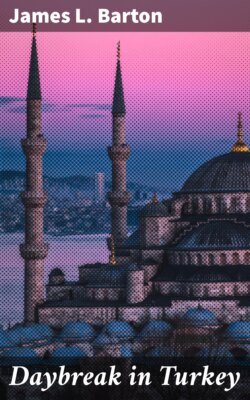Читать книгу Daybreak in Turkey - James L. Barton - Страница 15
На сайте Литреса книга снята с продажи.
SYRIANS OR JACOBITES
ОглавлениеTable of Contents
There is probably no distinct race in Turkey that may be called Syrian. Dwelling in Syria and extending north into Mesopotamia and east towards Persia are Christian peoples who do not belong to any of the races mentioned, but who are the direct descendants of the early Christian Church. This country has been the great meeting-ground of nations, over which have swept from time to time Egyptians, Greeks, Armenians, Persians, Mongols, Koords, and Europeans of every name and race. The presence of the sacred places of the Christian faith has called forth pilgrimages and given occasion for conflicts. It was here that the early Christian Church was named, and here have dwelt some of the greatest of the fathers of the early Greek Church, such as Ignatius, Justin Martyr, and Jerome. In those earlier days missionary influences went out from that land to other regions and countries.
Under the special effort of Constantine and his mother, Helena, pilgrims began to turn their steps towards Palestine, and monasteries sprang up all over the country. When Chosroes of Persia swept over that land, he slaughtered Christian monks by the thousand. Then came the Arabs with Mohammedanism, who converted some of the churches into mosques, but left others for the service of the Christians. Many Syrians accepted Islam and the strength of the Church waned. At the time of the crusades there were not more than five hundred thousand Christians in the country, according to some estimates. To win these the Roman pontiff had made prodigious efforts, but for the most part they refused to acknowledge the supremacy of the pope.
The Syrian Church, therefore, is the remnant which remains from the conflicts and persecutions of the last eight centuries. It does not represent a single race or people, but is able to trace its pedigree as a church back to the very beginnings of Christianity. The remnants of this early church are found throughout Palestine and northern Syria, including Damascus. They are found also in Mosul, Mardin, and northern Mesopotamia in considerable numbers. In the northern regions they are sometimes called Jacobites. There are many strong men among them and in some places not a little of the pride and glory of the old church remains. Some of their old churches and monasteries contain valuable manuscripts in the Syriac language of ancient date. The spoken language of these people is now, for the most part, Arabic.
They have suffered much persecution from the Mohammedans, especially from the Suljuk Turks, which had much influence in arousing the knighthood of Europe to enter upon the crusades. After the failure of the crusades these Christians were again subject to Moslem misrule at the hands of the Mohammedan sultans of Egypt and invaders from Turkey. The whole land was conquered in 1517 by the Ottoman Turk, Selim I. Except for the brief period (1832-1841) when Syria was held by Ibrahim Pasha, this country and this church have been under the rule of the sultan who sat upon the throne in Constantinople.
As the manuscript Bibles, liturgy, and church books were in Syriac, while the common people spoke and understood only the Arabic, Christianity became largely a matter of form from which the spirit had departed. The same conditions prevailed here which we shall discuss later in the Gregorian Church.
